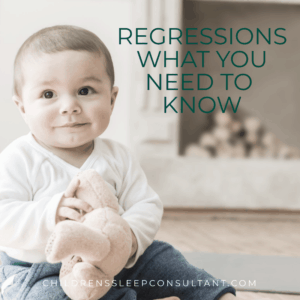What You Need to Know About Sleep Regressions
 We’ve all been there. Just when you think your child is sleeping well, sleep regressions occur and it seems that all your hard work is out of the window! All of a sudden your wonderful sleeper is waking again, and you’re sporting a pair of eye bags bigger than the mugs of coffee you’re guzzling. Let’s just take a step back here a moment and let me say this: don’t worry. You’ve not lost all the hard work you’ve put into sleep. But there are some things you can do to get back on track ASAP. This is what you need to know about sleep regressions, and what you can do to help your child through them.
We’ve all been there. Just when you think your child is sleeping well, sleep regressions occur and it seems that all your hard work is out of the window! All of a sudden your wonderful sleeper is waking again, and you’re sporting a pair of eye bags bigger than the mugs of coffee you’re guzzling. Let’s just take a step back here a moment and let me say this: don’t worry. You’ve not lost all the hard work you’ve put into sleep. But there are some things you can do to get back on track ASAP. This is what you need to know about sleep regressions, and what you can do to help your child through them.
The 4 month regression
This happens when your child begins to sleep differently and they begin to sleep more like an adult- with REM sleep and 45 minute sleep cycles.
The 6 month regression
Falling asleep for both naps and night sleep can become more of a challenge with this regression. Luckily it’s a little easier than the 4 month regression.
The 9 month regression
Brace yourself. This regression can last up to 6 weeks (argh!).
There is a lot going on with your child when they get to around 9 months old. They may be learning to crawl, stand up or even cruise. They’re also entering the biggest phase of separation anxiety that they ever will go through, and all of this makes leaving them to fall asleep independently a thing of the past. I won’t lie. This one is tough!
The 12-month regression
Just when things were getting back to normal after the 9-month regression, the 12-month regression hits! The good news though is that this regression isn’t as long as the 9 month regression (thank goodness!). You got through that one, you’ll get through this one too.
The 18-month regression
This is where things start to get interesting! By this age, your child will be more opinionated when it comes to going to sleep and may refuse to go down to sleep as easily as they used to. Joys!
The 24-month regression
This one is much the same as the 18-month regression, and temperament/ personality is again in full force during this period. Hang on in there!
What you need to do
Obviously we want your child to get over the regression as quickly as possible, and for you to get back to some resemblance of normality too. The good news is that this is fairly easy to do with all of the regressions apart from the 9-month occurrence, as this is the stage where your child is also dealing with a separation anxiety, making it somewhat more of a challenge. But not impossible!
Your child is going to need more help going to sleep during the 9-month regression and I do suggest giving them that extra help, but without creating new habits. Sit next to your child’s whilst they fall asleep, but don’t begin to rock them. Talk soothing and reassuring words to them, but don’t give them a feed every time they wake.
Your daily routine is really important during this time. Having super consistent routines, nap, night and daily, will make your child feel really secure and help them with the separation anxiety.
For all the other regressions, I suggest just going with the flow without introducing new habits. You will get less sleep during these regressions, so be prepared for them and be prepared for being tired. If you continue with your routines and how you deal with your child when they wake, they will get over the regression quicker and you’ll all be getting more sleep quicker!
Side note: things do get interesting when your baby becomes a toddler. Toddler’s LOVE being in charge! And being in charge of sleep is no exception. This can really make things a challenge. Remember you are the grown up, you are in charge. Your toddler may not like the fact that you are, but remaining in charge is paramount to them getting over these regressions quickly.
A toddler in charge at bedtime doesn’t fall asleep quickly or easily and will need your help many many times a night.



